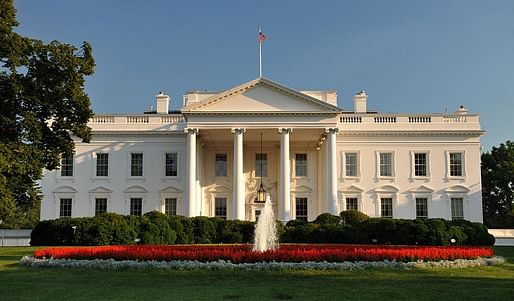

The White House has announced the establishment of a task force to enhance the sustainability credentials of federally-funded buildings. The Buy Clean Task Force will promote the use of construction materials with lower embodied carbon emissions and pollutants across their lifecycle, including at each stage of their manufacturing process.
The task force will develop recommendations on certain material types to prioritize in federally funded projects, as well as increase the transparency of embodied emissions through supplier reporting. This will include incentives and support to domestic material manufacturers seeking to report and reduce embodied emissions.

The task force is comprised of representatives from the Council on Environmental Quality, the White House Office of Domestic Climate Policy, the Environmental Protection Agency, the General Services Administration, the White house Office of Management and Budget, and the Departments of Defense, Energy, and Transportation. Each department will work towards the task force’s recommendations within their own briefs, such as the Department of Transportation effort to promote the use of low-carbon materials in projects funded by the recently-passed Infrastructure Law.
The initiative is one of several announced by the White House last week. Separately, the Department of Energy is launching a series of funding initiatives to promote clean hydrogen as an alternative to fossil fuels. Meanwhile, the Department of Commerce is leading an effort in collaboration with the European Union to restrict the import of steel and aluminum with poor sustainability credentials in the US and EU markets.
The US government are the latest political body to announce steps to tackle carbon emissions in the built environment. Earlier this month, the World Economic Forum published a framework for decarbonizing buildings, while in January New York Governor Kathy Hochul called for a ban on greenhouse gas emissions in new buildings by 2027. The past 12 months have also seen a series of climate actions taken at a state, federal, and international level, as we detailed in our 2021 Year In Review of Policy and Code in Architecture.
The moves by the White House also come weeks after the Biden administration formally reversed a controversial Trump-era mandate on the government’s Art in Architecture program. Last year, the administration issued a mandate to ensure federal vehicles and buildings run on renewable energy by 2050, while the AIA expressed its support for legislation that would reverse federal design mandates enacted by executive order in 2020.
No Comments
Block this user
Are you sure you want to block this user and hide all related comments throughout the site?
Archinect
This is your first comment on Archinect. Your comment will be visible once approved.